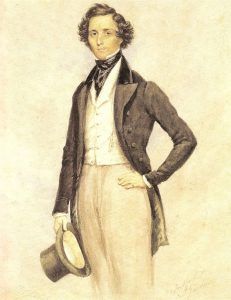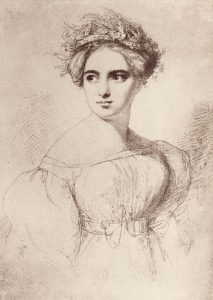4. Music of Felix Mendelssohn-Bartholdy (1809-1847) and Fanny Mendelssohn-Bartholdy (1805-1847)
In terms of musical craft, few 19th-century composers were more accomplished than Felix Mendelssohn-Bartholdy (1809–1847). Growing up in an artistically-rich, upper-middle class household in Berlin, Germany, Felix Mendelssohn received a fine private education in the arts and sciences and proved himself to be precociously talented from a very young age. He would go on to write chamber music for piano and strings, art songs, church music, four symphonies, and oratorios, as well as conduct many of Beethoven’s works as principal director of the Leipzig Gewandhaus Orchestra. All of his music emulates the motivic and organic styles of Beethoven’s compositions, from his chamber music to his more monumental compositions. Mendelssohn was also well-versed in the musical styles of Mozart, Handel, and Bach.

Felix Mendelssohn descended from a family of prominent Jewish intellectuals; his grandfather Moses Mendelssohn was one of the leaders of the 18th-century German Enlightenment. His parents, however, seeking to break from this religious tradition, had their children baptized as Reformed Christians in 1816. Anti-Semitism was a fact of life in 19th-century Germany, and such a baptism opened some, if not all, doors for the family. Most agree that in 1832, the failure of Felix Mendelssohn’s application for the position as head of the Berlin Singakademie was partly due to his Jewish ethnicity. This failure was a blow to the young musician, who had performed frequently with this civic choral society, most importantly in 1829, when he had led a revival of the St. Matthew Passion by Johann Sebastian Bach. Although today we think of Bach as a pivotal figure of the Baroque period, his music went through a period of neglect until this revival.
Initially, Mendelssohn’s father was reluctant to see his son become a professional musician; like many upper-middle class businessmen, he would have preferred his son enjoy music as an amateur. Felix, however, was both determined and talented, and eventually secured employment as a choral and orchestral conductor, first in Düsseldorf, and then in Leipzig, Germany, where he lived from 1835 until his death. In Leipzig, Mendelssohn conducted the orchestra and founded the town’s first music conservatory.
Felix Mendelssohn’s music was steeped in the styles of his predecessors. Although he remained on good terms with more experimental composers of his day, including Hector Berlioz and Franz Liszt, he was not fond of their music. It is not surprising, then, that he composed in genres passed down to him, including the symphony, string quartet, and oratorio.
Focus Composition: Excerpts from Elijah
One of his last works, Mendelssohn’s oratorio Elijah, was commissioned by the Birmingham Festival in Birmingham, England. The Birmingham Festival was one of many 19th-century choral festivals that provided opportunities for amateur and professional musicians to gather once a year to make music together. Mendelssohn’s music was very popular in England and the Birmingham Festival had already performed his oratorio St. Paul in the 1830s. The premiere of Elijah was given in English in 1846.
The oratorio Elijah is interesting because it is an example of music composed for middle-class music-making. The chorus of singers was expected to be largely made up of musical amateurs, with professional singers brought in to sing the solos. The topic of the oratorio, the Hebrew prophet Elijah, is interesting as a figure significant to both the Jewish and Christian traditions, both of which Mendelssohn embraced to a certain extent. (In general, Mendelssohn was private about his religious convictions, and interpretations of the oratorio as representing the composer’s beliefs will always remain somewhat speculative.) This composition shows his indebtedness to both Baroque composers Bach and Handel, while at the same time it uses more 19th-century harmonies and textures.
The following excerpts are from the first part of the oratorio and set the dramatic story of Elijah’s calling the followers of the pagan god Baal to light a sacrifice on fire. Baal fails his devotees; Elijah then summons the God of Abraham to a display of power with great success. The excerpts here involve a solo baritone who sings the role of Elijah and the chorus that provides commentary. Elijah first sings a short accompanied recitative, not unlike what we heard in the music of Handel’s Messiah. The first chorus is highly polyphonic in announcing the flames from heaven before shifting to a more homophonic and deliberate style that uses longer note values to proclaim the central tenet of Western religion: “The Lord is God, the Lord is God! O Israel hear! Our God is one Lord, and we will have no other gods before the Lord.” After another recitative and another chorus, Elijah sings a very melismatic and virtuoso aria.
Elijah was very popular in its day, in both its English and German versions, for music makers and audiences, and continues to be performed by choral societies today.
Listening Guide
Texas A&M Century Singers with orchestra; Weston Hurt, solo baritone
Composer: Felix Mendelssohn-Bartholdy (1809–1847)
Composition: Excerpts from Elijah
Date: 1846
Genre: recitative, choruses, and aria from an oratorio
Form: through-composed
Nature of Text: English text prepared for the premiere
Recitative—
Elijah: O Thou, who makest Thine angels spirits; Thou, whose ministers are flaming fires: let them now descend!
Chorus—
The People: The fire descends from heaven! The flames consume his offering! Before Him upon your faces fall! The Lord is God, the Lord is God! O Israel hear! Our God is one Lord, and we will have no other gods before the Lord.
Recitative—
Elijah: Take all the prophets of Baal, and let not one of them escape you. Bring them down to Kishon’s brook, and there let them be slain.
Chorus—
The People: Take all the prophets of Baal and let not one of them escape us:
bring all and slay them!
Aria—
Elijah: Is not His word like a fire, and like a hammer that breaketh the rock into pieces! For God is angry with the wicked every day. And if the wicked turn not, the Lord will whet His sword; and He hath bent His bow, and made it ready.
Performing Forces: solo baritone (Elijah), four-part chorus, and orchestra
What we want you to remember about this composition:
- It is an oratorio composed for amateurs and professionals to perform at a choral festival.
- It uses traditional forms of accompanied recitative, chorus, and aria to tell a dramatic story.
Other things to listen for:
- A much larger orchestra than heard in the oratorios of Handel
- A very melismatic and virtuoso aria in the style of Handel’s arias
- More flexible use of recitatives, arias, and choruses than in earlier oratorios
- More dissonance and chromaticism than in earlier oratorios
| Timing | Performing Forces, Melody, and Texture | Text and Form |
| 0:00 | Solo baritone and orchestra; minor key; dynamics from quiet to loud | Accompanied recitative: O Thou, who makest Thine angels spirits; Thou, whose ministers are flaming fires: let them now descend! |
| 0:31 | Chorus and orchestra; loud and polyphonic until the end, where it becomes homophonic (with rests between phrases) and quieter in dynamics | Chorus: The fire descends from heaven! The flames consume his offering! Before Him upon your faces fall! |
| 1:29 | Chorus and orchestra; homophonic and legato with longer note values: a more deliberate style for central claim of Western faith | Chorus: The Lord is God… |
| 2:25 | Soloist and orchestra; orchestra punctuating the ends of each of singer’s phrases | Accompanied recitative: Take all the prophets of Baal, and let not one of them escape you. Bring them down to Kishon’s brook, and there let them be slain. |
| 2:40 | Chorus and orchestra; homophonic | Chorus: Take all the prophets of Baal and let not one of them escape us: bring all and slay them! |
| 2:50 | Soloist and orchestra; homophonic, with a frantic orchestral accompaniment; wide-ranged melody with melismas | Aria: Is not His word like a fire, and like a hammer that breaketh the rock into pieces! For God is angry with the wicked every day. And if the wicked turn not, the Lord will whet His sword; and He hath bent His bow, and made it ready. |
Felix was not the only musically precocious Mendelssohn in his household. In fact, the talent of his older sister Fanny (1805–1847) initially exceeded that of her younger brother. Born into a household of intelligent, educated, and socially-sophisticated women, Fanny Mendelssohn was given the same education as her younger brother. But for her, as for most 19th-century married women from middle-class families, a career as a professional musician was frowned upon. Her husband, Wilhelm Hensel supported her composing and presenting her music at private house concerts held at the Mendelssohn’s family residence. Felix also supported Fanny’s private activities, although he discouraged her from publishing her works under her own name. In 1846, Fanny went ahead and published six songs without seeking her husband’s or brother’s permission.

Musicians today perform many of the more than 450 compositions that Fanny Mendelssohn wrote for piano, voice, and chamber ensembles. Among some of her best works are the four-movement Piano Trio in D minor, Op. 11, and several volumes of songs and piano compositions. This piano trio holds its own with the piano trios, piano quartets, piano quintets, and string quartets composed by other 19th-century composers, from Beethoven and Schubert to the Schumanns, Brahms, and Dvořák.
Music such as art songs, piano character pieces, and string quartets, primarily performed in small performing spaces, often for personal entertainment.
Multiple pitches sung to one syllable of text.
